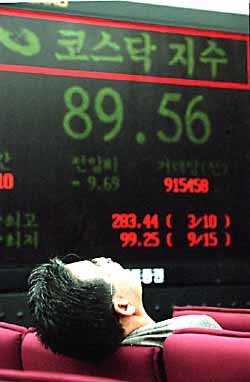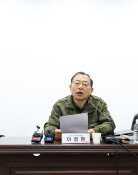KOSPI hits year's low at 577; foreign exchange, interest rates keep rising
KOSPI hits year's low at 577; foreign exchange, interest rates keep rising
Posted September. 18, 2000 21:33,

Concerns are growing over a possible financial panic as the stock market crashed and foreign exchange and interest rates due to a combination of bad factors such Ford Motor's pullout of a bid for Daewoo Motor, rising international oil prices and delayed restructuring.
The Korea Composite Stock Index (KOSPI) plunged to 577.56 points, decreased by 50.64 points (8.06 percent) over the last weekend and KOSDAQ index closed at 88.65 points, down 10.60 points (10.68 percent), hitting the year's low, respectively.
The financial market plunged into a psychological panic as a feeling of uneasiness about the possible inflation and shrinking current account caused by high oil prices add to the fear that a failure to sell off Daewoo Motor could increase the non-performing loans of banks, thus upsetting the restructuring efforts.
Experts said that the depressed financial market is feared to hurt the nation's credit rating since the international credit-rating agencies such as Standard & Poors and Moody¡¯s are to start their survey on the overall Korean economy today.
The KOSPI once dropped to 552.78, down 75.42 points at one point today, due to the selling spree by foreigners, shortly joined by individual investors.
Shares of Samsung Electronics, the nation's representative blue chip, fell to the daily permissible low during the day for the first time in about 26 months.
Decliners overwhelmed risers, 806 to 65, with six others unchanged. The Korea Stock Exchange activated the circuit breaker to suspend the market for 20 minutes from 1:02 p.m. to help allay the free-fall for the second time since April 17 this year.
The KOSDAQ market recorded the largest decliners since its opening with 546, 364 of which nose-dived to the daily permissible low.
Meanwhile, dollar sharply rose to 1,138.00 won at the Seoul¡¯s foreign exchange market once in the day, but the rate became stabilized in the afternoon as institutional investors went on a selling spree for short-term marginal profits to close at 1,131.40 won, up 11.50 won.
The interests of three-year national bonds also rose to 8.11 percent, up 0.19 percent from the previous day¡¯s 7.92 percent amid expectations that the sharp rise in foreign exchange rate following the stock price fall will bring about the rise in import prices and then long-term interest rates.







